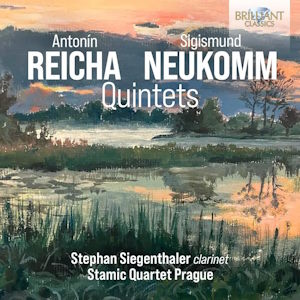
Antonín Reicha (1770-1836)
Quintet in B-flat for Clarinet and String Quartet, Op. 89 (1820)
Sigismund Neukomm (1778-1858)
Quintet in B-flat for Clarinet and String Quartet, Op. 8 (1809)
Stephan Siegenthaler (clarinet)
Stamic Quartet Prague
rec. 2016, Studio Martínek, Prague
Brilliant Classics 96596 [52]
Back in my early listening years, I got the idea that the music of Anton Reicha – as he used to be billed, German-style – was irredeemably dull. Perhaps the performances I heard – there weren’t that many – or their sonics were second-rate. Also, after uninspiring encounters with the Stamitzes, I may simply have written off all the lower-tier Classicists: “guilt by association.” First impressions can be extraordinarily tenacious: the prospect of Reicha still doesn’t thrill me.
So the Opus 89 Clarinet Quintet came as a pleasant surprise – when you can set off shiny reed phrases against darker, homogenized strings, you’re off to a good start, anyway. The first movement, in fact, is dominated by such back-and-forth dialogues, highlighting contrasts of articulation as well as timbre; the coda surprises us with a quick detour into the subdominant. In the Andante, lyrical clarinet phrases and contrapuntal elements help mitigate a basic duple-meter squareness. The Minuetto‘s nice one-in-a-bar lift, persisting through the more deliberate Trio, points the way to Beethoven’s scherzos. The Finale, building in larger paragraphs, maintains a similar lift; there’s a nice touch where the rhythm of a brief string fugato continues as an accompaniment for the clarinet. A few minor-key diversions aren’t long enough to spoil the upbeat mood.
The less familiar Sigismund Neukomm nonetheless had quite the career for a court musician, even serving for several years in Brazil, a colony of Portugal back then. His well-wrought quintet brings a few unconventional touches, like a slow, chordal introduction that feints at a French overture and then generates turbulence, finally arriving at an easy, unpressed Allegro. Its second theme is more stately, and there’s no obvious sectional repeat: the development arrives without warning. Dotted “calls to attention” open the Menuetto; its Trio is relaxed and “Viennese.” The Adagio comprises a theme and a series of short variations (with even shorter sectional repeats), unfolding easily, wrapping up without fuss. Perhaps confusingly – it threw me off – the finale, launched by chipper clarinet phrases, also feels like a set of variations, though it’s probably a rondo.
The playing here is impressive, especially considering the scores’ unfamiliarity. Stephan Siegenthaler plays with lovely legato and perky staccatos, as required, and he’s unfazed by Reicha’s fast, liquid arpeggios. The Stamic Quartet – yes, named after one of those composers I found dull – is deft and alert, projecting Reicha’s counterpoint clearly and sensibly, bringing good tonal weight to important chords in Neukomm’s finale.
One of the clarinet’s chalumeau interjections in the Neukomm hits the mikes hard, but otherwise the recording is exemplary.
Stephen Francis Vasta
stevedisque.wordpress.com/blog
Buying this recording via a link below generates revenue for MWI and helps us keep free access to the site




















